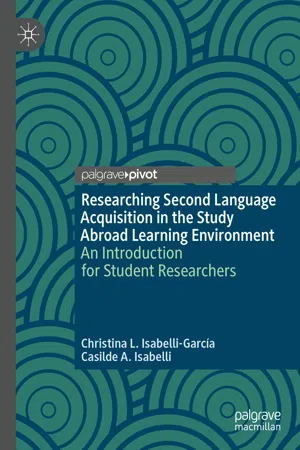Abstract
In this chapter, we introduce a number of concepts fundamental to our discussion of study abroad and language gains. As researchers, we must identify appropriate participants in order for our findings to be scientifically relevant. Therefore, we begin with an overview of the varying reasons sojourners might live, work, and/or study in a host country. We then limit the discussion to those sojourns that are primarily undertaken with the purpose of learning the host country’s language, and we focus on what education abroad means to these learners. We continue with a description of typical study abroad program durations, types, and housing options, and consider their varying benefits and limitations on language learning. The chapter concludes with an overall summary as well as questions for reflection and suggestions for further reading.
1.1 What Are the Different Types of Sojourns Abroad?
We start by considering the following question: What are the differing sojourns abroad? Sojourners might travel abroad for a variety of reasons: adventure, extended vacation, volunteering opportunities, internships , work, professional training programs, high school or university study, faculty fellowships, education or business exchanges, and religious mission. However, sojourners to foreign countries can be categorized into two general groups: those who travel abroad to work and those who travel abroad to further their education. Although the reasons for the sojourns are different for these two groups, one uniting truism is that living in a foreign country will almost certainly mean being in an unfamiliar environment and culture, and at times grappling with a foreign language.
1.1.1 Working Abroad
People who work abroad make up the first category of international sojourners. The trips workers take normally benefit an outside entity, such as a corporation, university, humanitarian program, or church. Working abroad encompasses three general categories: international jobs, fellowships, volunteer and internship programs, and religious missions. These work abroad opportunities allow sojourners to use and improve their skill or service while having the unique experience of living in another culture. During their time abroad, the sojourners will need to adapt to new surroundings and make personal and professional adjustments, providing them an opportunity to gain intercultural competency. The popularity of work abroad sojourns among young adults entering the workforce results from the growing importance of globalization in the world market and because traveling to foreign countries has become relatively simple.
1.1.1.1 Career Posts
As in any job market, employment in foreign countries can be divided broadly into two categories: professional or skilled positions that require considerable experience and, most often, considerable education or training as well, and those that require minimal experience or training. Professional jobs are generally offered from the sojourner’s home country, and the employee will typically receive a higher salary and incentives, such as help with housing and relocation expenses, than a nonprofessional employee. Common jobs that fall into this first category include:
Language teaching positions. These are among the most popular overseas positions for English speakers.
Government positions. These positions range from long-term employment contracts to short-term consulting or contracting jobs.
Nongovernmental organization (NGO) positions. Normally, NGOs seek employees with demonstrated leadership abilities who are interested in improving living conditions in developing nations. NGOs also offer volunteer and mission-oriented positions.
Multinational corporation positions. These can be considered career-post positions in which an employee of a multinational corporation is sent abroad for any of a variety of reasons relating to the corporation’s assets abroad. Typically, employees are tasked with setting up and/or managing a factory, branch, or joint venture; or handling marketing, purchasing, and subcontracting; or providing consultation and/or training to the sister company abroad. Examples of multinational corporations include Billabong, BP (British Petroleum), Coca-Cola, Dunkin’ Donuts, Facebook, Google, McDonald’s, Sony, Starbucks, and Wal-Mart, to name only a few.
In contrast, informal jobs that require less experience can often be easily obtained while abroad, rather than being arranged beforehand. However, foreign employers of nonprofessionals usually offer lower wages, fewer benefits, and only short-term employment compared to employers of professionals. Positions in this area include jobs in the tourist industry (hotels, theme parks, ski resorts, tour guides) and in seasonal agriculture. Informal language teaching contracts are also included in this category.
1.1.1.2 Volunteer and Service-Based Jobs
The second category of workers abroad is service-based jobs in which cultural immersion and personal development are experienced in the context of providing humanitarian aid. Many underdeveloped countries rely on programs such as the Peace Corps, the Foreign Service Institute, Doctors Without Borders, and Operation Smile, among other international aid organizations, to provide highly needed medical, social, and environmental volunteer services. These programs allow volunteers to travel and live abroad for a small fee or for free while volunteering their time in a social institution or toward completing an environmental project. Social institutions that benefit from foreign volunteers include medical clinics and hospitals, nursing homes, schools, and orphanages. In addition, underdeveloped countries often need help in protecting their natural environment or developing environmental assets. Thus, volunteers can become involved with projects that involve wildlife conservation, sustainable agricultural development, building wells and other drinking water infrastructure, as well as maintenance and improvement of zoos. As guests who are directly interacting with foreign populations, volunteers experience the residents’ daily struggles and come away with a realistic understanding of a community’s living conditions, concerns, and aspirations.
1.1.1.3 Working Scholars
The third category of working sojourners is made up of those individuals who have completed their university education and become fellows. Fellows are an elite group of academics who have won competitive teaching...
